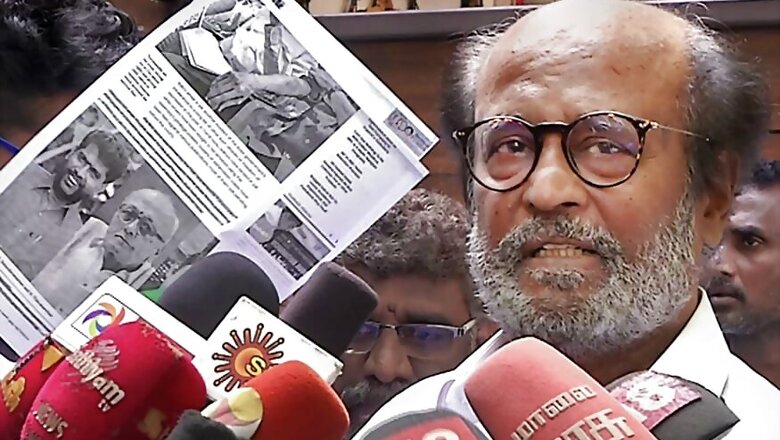
views
Not a day passes when free speech isn’t hurt in our country. When the saffron hotheads don’t scream about their sentiments getting hurt, the social justice warriors lead the assault on the right to freedom of expression. The recent cases against social activist and Magsaysay Award winner Sandeep Pandey and Tamil superstar Rajinikanth underline this fact.
Aligarh police has booked Pandey for allegedly using abusive and inappropriate words against Hindutva ideologue and freedom fighter Veer Savarkar. He has been accused of using objectionable language for Savarkar while speaking at a protest assembly against the Constitutional Amendment Act on the Aligarh Muslim University campus.
Down south, Rajinikanth is facing flak from pro-Tamil outfits for having allegedly made controversial remarks against social reformer Periyar EV Ramasamy, the father of the Dravida movement. The reactions from Dravida activists have been on familiar lines.
The actor has been castigated; his effigy has been burnt; protests have been organised against him. Further, a party, the Dravidar Viduthulai Kazhagam, has demanded an unconditional apology and registered filed police complaints against the actor. Rajinikanth, however, has remained undaunted and refused to apologise.
What we need to discuss is not whether the views of Pandey and Rajinikanth are justified; the point here is that they should be allowed to say what they think is correct, even if their thinking is incorrect, misleading, or even mischievous.
Free speech should be curbed only if it harms somebody. As John Stuart Mill wrote in the introductory section of his great work On Liberty, “the only purpose for which power can be rightfully exercised over any member of a civilised community, against his will, is to prevent harm to others.”
The great philosopher went on to illustrate the matter. “No one pretends that actions should be as free as opinions. On the contrary, even opinions lose their immunity, when the circumstances in which they are expressed are such as to constitute their expression a positive instigation to some mischievous act. An opinion that corn-dealers are starvers of the poor, or that private property is robbery, ought to be unmolested when simply circulated through the press, but may justly incur punishment when delivered orally to an excited mob assembled before the house of a corn-dealer, or when handed about among the same mob in the form of a placard.”
Let’s take an example from the present context. A socialist is not only entitled to his view — preposterous though it is — that private property is theft, but also free to express it. He, however, crosses the line only when he convinces, coaxes, or instigates his followers to such an extent that they immediately carry out violent activities against propertied persons or property.
This principle was accepted in America, though 110 years after it was enunciated by Mill. The US Supreme Court, in the Clarence Brandenburg Vs. State of Ohio case (1969), accepted that “the principle that the constitutional guarantees of free speech and free press do not permit a State to forbid or proscribe advocacy of the use of force or of law violation except where such advocacy is directed to inciting or producing imminent lawless action and is likely to incite or produce such action.”
Interestingly, the “imminent lawless action” test has been found valid by our Supreme Court. In the Arup Bhuyan vs State of Assam case, the Bench of Justices Markandey Katju and Gyan Sudha Misra said on February 3, 2011: “We respectfully agree with the above decisions [of the Brandenburg case], and are of the opinion that they apply to India too, as our fundamental rights are similar to the Bill of Rights in the US Constitution.”
Applying this test to the Pandey and Rajinikanth cases, we see that in neither of the cases violence ensued. Therefore, there is no reason that any police case should have been filed against the two men.
It needs to be emphasised here that the curbs on free speech have to be rational and not arbitrary or political, for the Indian Constitution imposes “reasonable restrictions” on the fundamental right to freedom of expression. The restrictions can be imposed for the maintenance of “the security of the State, friendly relations with foreign States, public order, decency or morality, or in relation to contempt of court, defamation or incitement to an offence.”
Since the restrictions ought to be reasonable, hurting the sentiments of somebody can never be grounds for curtailment of the freedom of expression.
Yet, the right to freedom of expression is undermined continuously by all kinds of people — unscrupulous politicians, tetchy activists, self-appointed moral guardians, publicity seekers, blackmailers. Even as we celebrate the 70th anniversary of the republic, its cherished idea, liberty, gets chipped away slowly but steadily.
(The author is a freelance journalist. Views are personal)




















Comments
0 comment